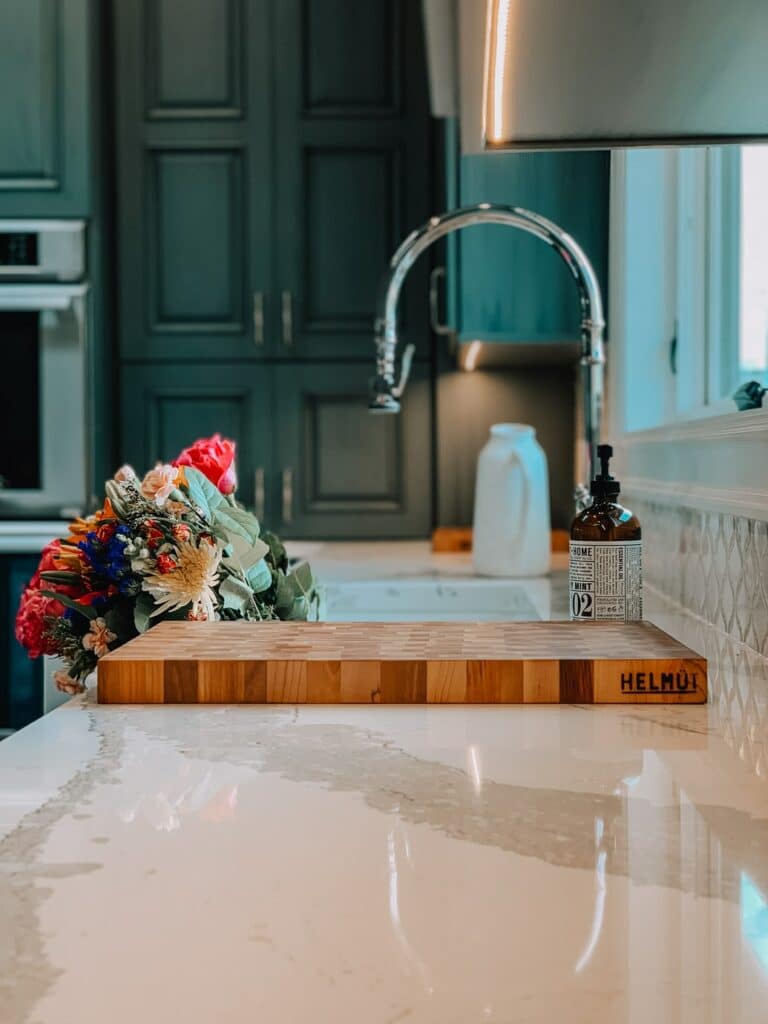Quartz Countertops is probably one of the most joyous investments you made in your home and rightly so. They compensate for a steep price in both beauty and durability.
Quartz is one of the most sought-after high-end materials used to make countertops and its popularity keeps growing.
Quartz countertops can either be natural or blended. This means that you can get the bare stone that is pure or you can get the blended version where pure quartz is mined and mixed with resin and pigments to form a solid block.
Most of the quartz available is a resin mixture. The quantity of resin can be between 5% and 10%. The resin creates an even, smooth, glossier surface, and pigments inject color and patterns on quartz.
Quartz is a highly durable material and stain-resistant. Since it is not porous, it is almost never sealed for protection and does not need this layer of protection.
Quartz countertops are very difficult to stain permanently and one of their merits is how little maintenance they require.
Simple spills cannot form stains if they are wiped off immediately and for a stain to form, spilled food, water, and other substances would have to be left on the countertop for extended periods of time. Extreme heat can form permanent stains and fixing such stains could compromise the integrity of your countertop.
Table of Contents
What Causes Staining on Quartz Countertops

The resin mixed in with the quartz is what makes the final product nonporous. If the resin is damaged, the quartz will be able to absorb the staining agent such as coffee or wine.
The resin also gets damaged by prolonged exposure to high heat, abrasive and bleaching cleaning agents, unwiped stains, scratches, and cracks.
For regular cleaning, habitually wipe with warm water containing some regular dish soap and never let stains sit on your countertops and dry out. Never scratch stuck stains using sharp tools such as knives and use protective measures such as trays and mats before placing hot items on quartz.
Do not use your quartz countertops for chopping and cutting. Use chopping boards always.
How to remove stubborn stains from your quartz countertop
Dried Foods
Quartz Countertops left foodstuff on your countertop and let it dry, you may be tempted to use a knife to scrape it off. This will definitely damage your countertop and make it more prone to permanent staining in the future. Instead pour warm water on the crust and allow it to soften for a few minutes. Wipe it off.
If this does not deal with the problem, use a plastic spatula to scrape off the remainder since plastic will not create scratches on the surface. You can also use warm water and a soft kitchen brush to scrub off the stuck solids making sure to use only mild force. The food should easily come off.
Finally, pour some regular dish soap into a basin of warm water and wipe down the countertop. Rinse off the surface with plain water and wipe with a dry towel.
Coffee and Tea
The caffeine and caramel in coffee and tea should not stain quartz unless they react with the resin and pigments to form a stain. If you have stained your countertop, baking soda could fix it. In warm water, add baking soda and mix thoroughly.
Dip a table cloth in this mixture and wipe the stain. Rinse with plain warm water and dry the surface. Baking soda solution works on fruit and juice stains as well.
Ink and Permanent Marker

It is a nasty stain to have especially because it is a difficult substance to get rid of and it is very visible. Ink can be cleaned easily using paint thinner and acetone but these chemicals will damage your quartz countertop irreversibly.
There are products that can dissolve the ink without corroding the surface of your countertop so do not reach for your nail polish remover. Goo Gone is a better option. Apply Goo Gone on the ink stain and let it sit for 5 – 10 minutes then wipe it off.
The ink should be gone. Use warm water with mild dish soap to wash the area to ensure no Goo Gone residue is left on your countertop. Rinse with plain water and dry with a towel.
Though this may not always work, try using toothpaste and hairspray in the same fashion as Goo Gone first. If they do not work, Goo Gone is your best bet.
If ink stains are a common occurrence for you, it may be best to apply a seal or a finish on your countertop since cleaning ink this way will eventually corrode the resin leaving your countertop vulnerable to a permanent stain.
Wine
Dessert wine or cooking wine stains will ruin beautiful countertops. However, wine can only stain quartz if allowed to sit unwiped for long. If you have made this mistake, clean the stain as soon as possible.
Cooking wine is more acidic and may leave a tougher stain than regular drinking wine.
Pour some rubbing alcohol on a dry cloth and rub gently on the wine stain. Repeat until the stain is gone. Wash with warm soapy water and rinse with plain water. Rubbing alcohol is a solvent and though it is not particularly strong, it can corrode resin following repeated use and brute force. Only use rubbing alcohol on quartz if it is absolutely necessary.
Turmeric and Food Color
Turmeric and food color spills should be dealt with immediately. Allowing them to settle and may stain your quartz countertops permanently. Turmeric is a particularly stubborn substance and in some cases can resist a variety of removal options.
To remove turmeric and food dyes, start by applying a baking soda solution to the stain and letting the solution sit for a while. You can use plain lemon juice or plain vinegar on the stains. Wash and rinse the surface leaving no residue. If these fail to clean the stain buy a natural stone cleaning solution. They are formulated for natural stones and will not corrode and damage the resin.


